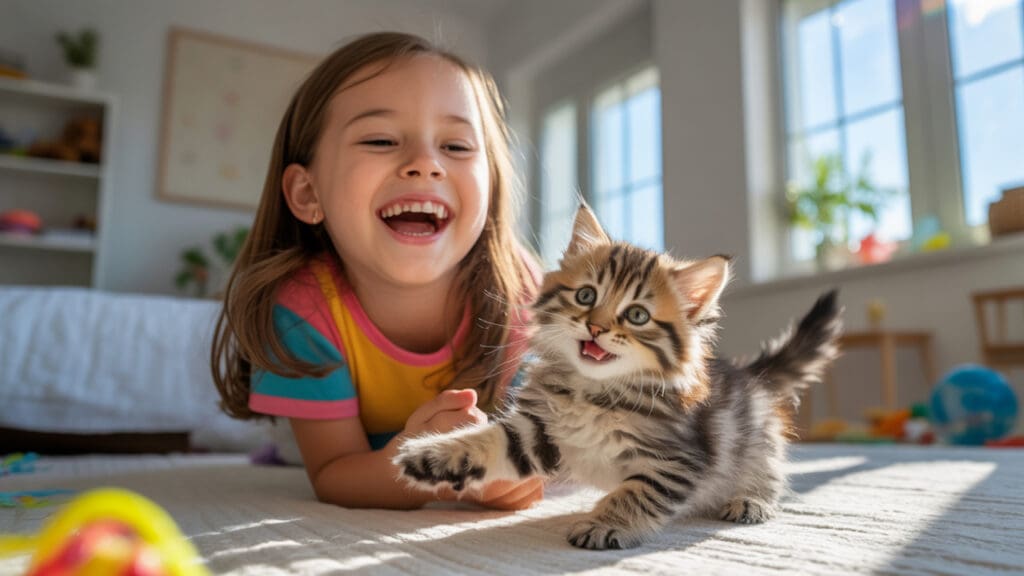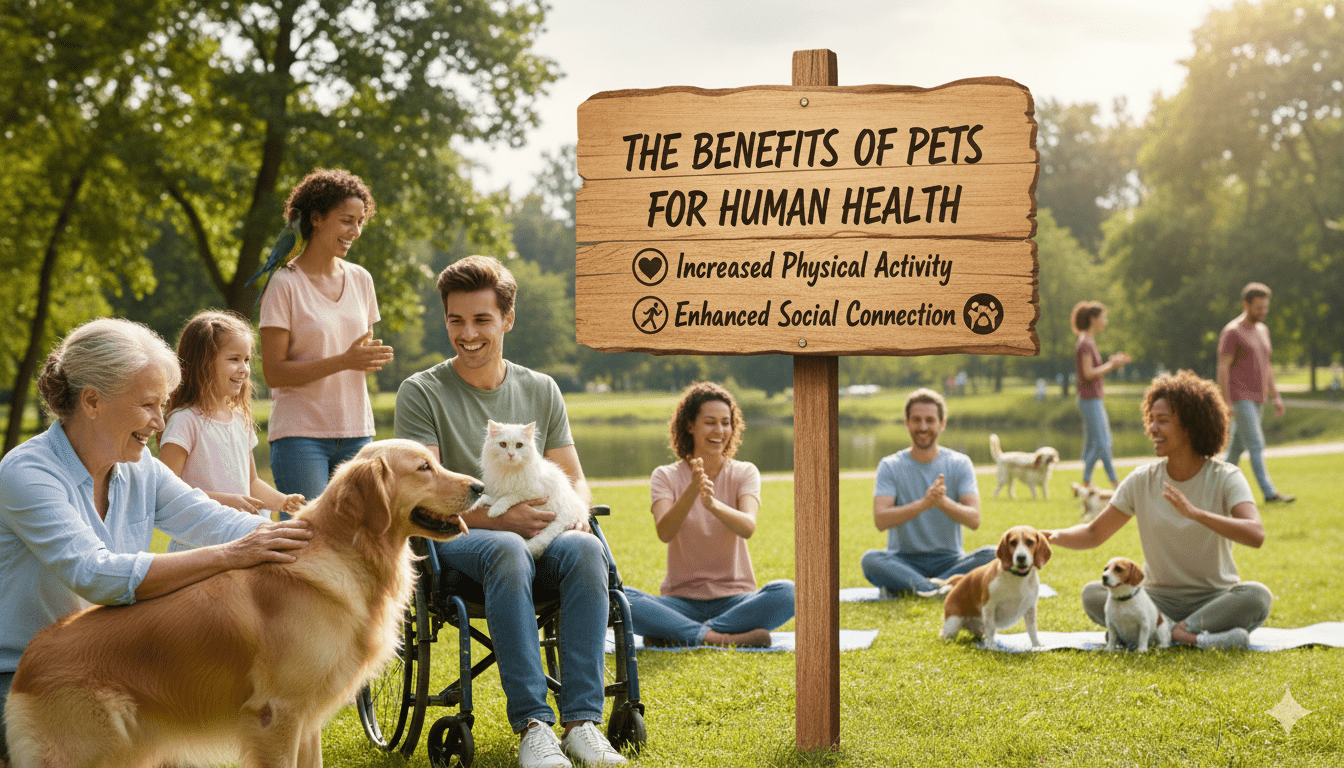The Benefits of Pets for Human Health (2025): Expert Guide on Physical & Mental Wellness, Misconceptions, and Real-World Applications
You’ve had a stressful day at work. You’re tired and don’t even feel like talking to another human being. But the instant you open that door, you’re greeted by that wagging tail or the soft rumble of a purr. That instant relief just washes away all the weariness of the day.
Now, you should know that science does show that human-animal interaction can lower our cortisol levels. It can also regulate our heart rates and strengthen emotional resilience.
In fact, researchers say pet parents usually feel less lonely compared to those without one. And they are likely to achieve their daily activity goals and maintain lower blood pressure. This just means that the benefits of pets for human health go beyond mere companionship.
That said, you’ll need to know that those benefits depend on how consistently you engage with your pet. You’ll also need to be compatible. And of course, being practical in terms of budgeting for food and vet care will play a big part in sustaining that healthy equilibrium.
Remember, don’t just assume that owning a pet automatically equals great human health. You will need to put in some effort to interact with your animal in the right way.
Let’s dive into this article to see the real-world impact of pet ownership, then. You’ll be able to make smarter decisions that enhance your well-being with that furry partner by your side.
What Are the Health Benefits of Having a Pet: General Overview

So, what benefits do pets have on humans? After all, taking care of one requires time and money. It’s a lot of effort to maintain their health, too. So, why go through the trouble of adopting one? Well, you should be pleased to know that your pet is actually doing your health some good, both physically and psychologically.
One of the most striking advantages of owning a pet is its effect on your daily wellness routine. Your dog, for instance, is very likely to encourage you to take regular walks and play with them outdoors. They make you move even if you don’t feel like it.
Such increased movement is very much needed to help improve your cardiovascular health and maintain a better weight. With that, your immune resilience should also see improvement. Experts even say that increased activity can help reduce stress and heart-related risks in the long run.
As for the benefits of pets on mental health, you should know that your animal can trigger a sense of emotional grounding and comfort. Just by interacting (not even exercising) with them, you can experience lower stress levels. This, then, naturally supports emotional stability.
The calming effect of interacting with your pet can help you cope better with anxiety and feelings of loneliness. For older adults or those living alone, having a pet can at times provide a sense of purpose and companionship. This translates to improved quality of life.
Of course, there’s a cost involved in taking care of a pet. You’ll need to think of food and grooming. From time to time, veterinary care will add to that financial burden. That said, such a drawback is usually offset by the non-monetary return in terms of both physical and mental well-being.
Is Having a Pet Good for Your Health: The Science of Human-Animal Interaction

You should know that the connection between humans and animals is both emotional and deeply psychological. When you interact with your pet, a series of neurochemical and autonomic responses unfold in your body in measurable ways.
First of all, your interaction with your pet stimulates oxytocin release while inhibiting cortisol through the hypothalamic–pituitary–adrenal (HPA) axis. This lowered stress response reduces inflammation and provides you with better autonomic balance.
The hormonal shift also improves vagal tone. In simple terms, it helps support your heart rate variability, making your cardiovascular responses steadier under stress. You should know that just 5-15 minutes of contact with your companion animal can help reap such parasympathetic benefits. Think of this as a built-in stress relief switch.
Importantly, your interaction with the pet also activates your prefrontal cortical regions. Essentially, this is the part of your brain that helps manage your emotions and think clearly.
At the same time, it also calms down the limbic system. In turn, this means better focus for you and improved mental resilience. Experts say that these effects are tied to improved pain tolerance and more stable blood pressure over time.
Having said that, you’ll only be able to reap these benefits through daily, structured engagement with your pet. Just passive interaction isn’t enough. So, keep that play with your furry friend up.
Beyond Oxytocin: The 2025 Science of Pets and Our Brains

The oxytocin story is just the beginning. Recent studies are revealing even more fascinating mechanisms. Here’s what happens in your brain today when you connect with your pet.
The “Dopamine Nudge”: Every time your dog brings you a ball or your cat greets you at the door, it creates a small, positive reward cycle in your brain, releasing dopamine. This reinforces the bonding behavior and makes you seek more interaction, creating a natural, healthy feedback loop for activity and connection.
The “Mindfulness Trigger”: Pets live almost entirely in the present moment. When you’re with them—especially during calm petting or focused play—they pull your brain out of its default mode network (the area linked to anxiety and overthinking) and into the present. This is an informal, powerful mindfulness practice that reduces activity in brain areas associated with rumination and self-referential worry.
The Social Bridge Effect (with a 2025 Twist): For those in remote or hybrid work situations, pets are a powerful antidote to isolation. They initiate non-demanding interaction. A 2025 study of over 8,800 participants found that dog ownership was significantly associated with higher social capital, helping owners build stronger community connections. With 74% of remote workers reporting that pets improved their mental health while working from home, they serve as crucial emotional anchors in our increasingly digital world.
Benefits of Pets on Physical Health: The Power of Regular Movements
Now, let’s zoom in a bit more on the physical health benefits your pet can bring you. Let’s take a dog as an example. Most canine parents usually have to walk 2,500-3000 more steps every day to accommodate their dogs’ habits. This, in turn, is great for their hearts and overall metabolism.
Regular activity from taking care of your pet can lower systolic and diastolic blood pressure. It can also improve how quickly your heart recovers after exercise. And most importantly, it reduces the chance of you developing hypertension.
For older adults, regular movement doesn’t mean they have to engage in something taxing. Activities like feeding and taking your pet out for short walks can be beneficial. They help improve balance and mobility. And that lowers the risk of falls.
Now, you might have heard people saying that pets can introduce microbes to children. In most cases, yes, it’s a risk. But this also helps train their immune system to react appropriately. This, then, could lower the risk of your child overreacting to harmless triggers, reducing their chances of allergies later in life.
The next thing is sleep benefits. Exercising, in general, can help improve your sleep patterns and thus support your body’s natural rhythm. With that active pet of yours around, you’re more likely to get much better sleep than not.
Also, indirectly, some people can recover from surgeries a little faster because of the extra movement and stress relief that come with pet ownership. It’s less of them giving you the direct benefits. It’s more like the push they give you.
The Benefits of Pets for Human Health: Children’s Responsibility and Emotional Stability
Physical health isn’t the only thing we should consider when talking about the benefits of pet ownership. Having an animal around the house can help with individuals’ growth in responsibility and empathy. This is especially important for children.
Letting your child “help out” with taking care of your pet can be surprisingly beneficial. It teaches them about responsibility and establishing a routine. Start with something simple. Maybe you can have them fill the water bowl and lightly brush the animal’s fur. Or perhaps you can have them take the pet out for a short walk.
All these simple, repetitive tasks can give your child a sense of agency. And the consistency can, in turn, foster emotional stability. Your kid will learn that their actions are directly impacting another living being’s well-being.
The next thing is the bonding and trust that come with handling animals. Playing and interacting regularly with a pet can calm your child down, helping them to control strong emotions. That means they may grow up to be more emotionally resilient. It also improves their self-soothing skills and grants them greater capacity for empathy.
Know that these early experiences can set the foundation for healthier emotional patterns in adulthood. Your child is likely to develop stronger social connections and better conflict resolution skills if they grow up with that loving pet of yours.
This all means that your pet is often the shared emotional anchor in your family. They help strengthen human-animal and parent-child bonds through joint care responsibilities.
Common Misconceptions About the Benefits of Pets for Human Health
You now know that there are many benefits to owning a pet. That said, misconceptions about pet ownership are just as widespread. Let’s take a look at some of them and get to know what you should expect to come with having your own animal companion, realistically.
Possibly one of the most common myths out there is the belief that owning a pet is equivalent to better health. That’s not exactly accurate. The benefits will depend on your regular interaction and emotional connection with the animal. If you don’t care for them properly or if you’re not compatible at all, you’re likely to feel more stressed out than not.
Another misconception is that all pets have the same kinds of health benefits. Unfortunately no. Your high-energy dog may boost your physical activity. That calm indoor cat, on the other hand, may provide you with emotional comfort but not cardiovascular benefits. It really depends on the species and temperament. The key is to get one that matches or enriches your lifestyle.
Moving on, a lot of people think that pets can take the place of professional mental health care. Well, your animal can certainly ease loneliness and reduce some level of your anxiety. But they are in no way “fixing” any deep-seated emotional struggles. So, don’t put that unfair pressure on your pet.
Cost is also something people underestimate. Proper pet care doesn’t just mean food and grooming. It also involves long-term vet visits and vaccinations. Sometimes, you might even need to deal with emergencies. So, plan well and don’t plunge yourself into a deep financial burden.
Lastly, don’t assume that your child will automatically learn responsibility on their own. You’ll need to model and guide them consistently. It’s patience and structure that help them get to the point you want them to be.
Real-World Applications: The Benefits of Pets for Human Health
Let’s take a look at how some of the benefits of pets for human health play out in our everyday lives. You should know that people apply such benefits to therapy and wellness programs. They are living examples of how pets can transform one’s health.
Perhaps one of the most powerful applications is in animal-assisted therapy programs. These include the use of dogs, cats, and even rabbits in hospitals and rehab centers. The aim is to have the animals calm the patients and help lower their pain levels.
If the patient has a chronic illness, the steady companionship can help maintain a routine. This then supports better adherence to treatment. And it’s an overall improvement in their quality of life.
Pets are also good for community and workplace wellness. Some companies are starting to integrate pet-friendly office policies or therapy dog visits to help reduce work stress and boost morale. It’s a great way to keep employees engaged.
A few schools involve therapy animals to help manage students’ stress. They help improve their focus and develop some level of emotional resilience.
Naturally, for you as an individual, your pet is like a personal wellness tool. They encourage you to take more walks and provide you with built-in social interaction opportunities. They can also ground you emotionally and give you a sense of purpose. All in all, they are a natural way to boost your health level.
The Pet-Owner Compatibility Scorecard: Is a Pet Right for YOUR Lifestyle?
You’ve seen the benefits, but the biggest mistake you can make is choosing the wrong pet. The benefits only come with compatibility. Use this scorecard to find your match.
| Your Lifestyle Factor | Question to Ask | High-Energy Pet (e.g., Dog) | Low-Energy Pet (e.g., Cat, Rabbit) |
| Activity Level | How many minutes of intentional exercise can you commit to daily? | 60+ mins (Walks, runs, park trips) | 0-20 mins (Play with toys indoors) |
| Home Environment | What is your living space like? | House with yard, or active apartment life | Apartment, small space |
| Time & Patience | How much daily training/grooming can you handle? | High (Puppies need training, some dogs need frequent grooming) | Low to Moderate (Litter box training is simple, most cats groom themselves) |
| Budget | Can you handle unexpected vet bills of $500+? | Higher (Larger dogs eat more, potential for costly joint issues) | Generally Lower (But still significant for emergencies) |
| Desired Interaction | Do you want a cuddly companion or an independent presence? | High interaction, often “in your business” | Variable; often independent, affectionate on their terms |
Conclusion: Scoring mostly on the left? A dog might be your perfect wellness partner. Mostly on the right? A cat, rabbit, or even a bird could provide the calm companionship you need without the lifestyle mismatch.
FAQs About the Benefits of Pets for Human Health
Do you still have questions about the benefits of pets for human health? No worries. We understand that you’re trying to cover all grounds before making a decision to adopt an animal. Let us help clear up your doubts by presenting the most frequently asked questions surrounding this topic.
1. Why are pets important to humans?
That pet of yours can offer consistent companionship, emotional stability, and a sense of purpose. They can help reduce feelings of isolation and provide daily structure. Both can support healthier lifestyles.
2. What are the benefits of companion animals to human health?
Your companion animal can help lower your stress levels and reduce blood pressure. Many people also experience better sleep and stronger immune systems due to consistent, positive interaction with their pets.
3. How do pets improve mental health?
Regular interaction with your pet can boost oxytocin and serotonin levels. These two hormones are associated with calmness and happiness. This biochemical response can improve mood and support emotional balance.
4. Why pets are good for children?
Pets can help children develop empathy and responsibility. Their companionship offers emotional security and can improve your kid’s self-esteem during key developmental years.
5. What is the purpose of pets at home?
Beyond simple companionship, your pet can help create a comforting home environment. They encourage daily activity and reduce stress. They also push or help pet parents to build healthier routines.
6. How do pets contribute to physical health?
Your pets may help promote physical activity through walks, play, and care routines. These daily movements can lower cardiovascular risks and improve mobility. They also support weight management.
7. Can having a pet help reduce stress levels?
Yes, petting or spending time with an animal can lower cortisol, the body’s stress hormone. And it boosts the feel-good chemicals in our bodies. This makes pets a powerful tool for stress relief.
8. What role do pets play in improving social connections?
Your pet can often act as a social bridge. They help owners meet new people and form community bonds. This can reduce loneliness and strengthen emotional resilience.
9. How does pet ownership affect longevity?
Generally speaking, responsible pet owners may enjoy longer, healthier lives. This is linked to increased activity and overall improved emotional well-being.
10. Are there any health risks to consider when owning pets?
Yes. You’ll need to watch out for allergies and zoonotic diseases. Also, don’t underestimate the costs of taking care of a pet. You’ll need to plan for regular vet checkups and maintain proper hygiene.
The Benefits of Pets for Human Health: Can Pets Truly Make an Impact?
Now you know that the connection between humans and animals is both heartwarming and scientifically powerful. Just remember that you’ll need to keep consistent, intentional interaction with your pet to reap the benefits.
With that furry companion of yours around, you’re likely to experience lower stress hormones and improved cardiovascular health. In time, you’ll most likely see an improvement in mental clarity and reduced risk of chronic health issues, too.
Definitely, you’ll need to choose a pet that fits your lifestyle. And make sure you understand the responsibilities and commitment involved in taking care of that adorable animal of yours. Also, be patient. Just securing that animal doesn’t mean you’ll get a quick fix to your anxiety problems. It takes time.
So, let’s make a move and choose the right pet for yourself. Know that you’re making an investment in your health with a loyal animal companion.
Do you have a pet? How have they made a difference in your life? Share your story with us in the comments down below! We’d love to hear it.


